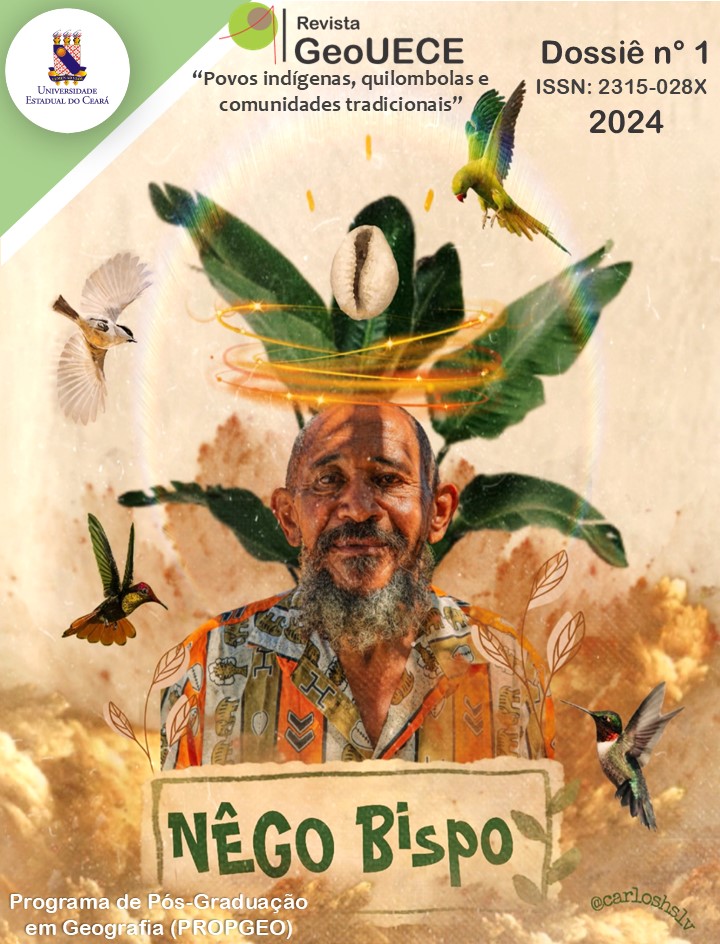Autorreconhecimento quilombola
Uma análise sob a perspectiva educacional geográfica na comunidade Serra dos Mulatos em Jardim-CE
DOI:
https://doi.org/10.52521/geouece.v13i25.12485Palavras-chave:
Autorreconhecimento quilombola, comunidade escolar, educação geográfica.Resumo
A educação escolar deve ser um espaço de pluralidade étnica e cultural, onde o educando possa se auto afirmar e dessa forma construir ou reconstruir seu caminho no âmbito de sua comunidade rumo à uma consciência coletiva. A pesquisa se desenvolveu no Programa de Doutorado em Geografia da UECE e teve como objetivo geral analisar o autorreconhecimento quilombola sob as perspectivas territorial e educacional Geográfica a partir de um estudo realizado na Comunidade Quilombola Serra dos Mulatos em Jardim-CE, uma comunidade quilombola com autorreconhecimento recente, e como objetivos específicos: discutir sobre os principais obstáculos para o autorreconhecimento quilombola, dissertar sobre o papel da Escola no contexto das comunidades negras e quilombolas, debater aspectos educacionais e territoriais geográficos relevantes para promoção do autorreconhecimento. Para desenvolvimento da pesquisa sob abordagem do método dialético e o fenomenológico adotamos como técnica de coleta de dados o estudo de campo classificado como exploratório descritivo, dividido em duas fases, a primeira com aplicação de entrevistas aos professores da escola quilombola e à primeira professora da comunidade, e a segunda com levantamento de dados documentais junto a unidade escolar e à Associação de Remanescentes, após da aprovação no Comitê de Ética e Pesquisa. Com a análise dos dados podemos compreender que múltiplos fatores obstaram ao autorreconhecimento da comunidade quilombola, dentre eles a dificuldade histórica para escolarização dos remanescentes, a ausência de formação específica dos professores na área étnico-racial, a ausência de professores quilombolas e a inexistência da autocrítica quanto a fragilidade do próprio sistema educacional.
Downloads
Métricas
Referências
BRASIL. Ministério da Educação, Secretaria de Políticas de Promoção da Igualdade Racial. Diretrizes Curriculares Nacionais para a Educação das Relações Étnico-Raciais e para o Ensino de História e Cultura Afro-Brasileira e Africana. Brasília: MEC, SEPPIR, 2004.
BRASIL. Ministério da Educação, Secretaria de Educação Continuada, Alfabetização, Diversidade e Inclusão. Plano nacional de implementação das diretrizes curriculares nacionais para educação das relações étnico-raciais e para o ensino de história e cultura afro-brasileira e africana. Brasília: MEC, SECADI, 2013.
CARITAS DIOCESANA CRATO, GRUPO DE VALORIZAÇÃO NEGRA DO CARIRI. Caminhos: Mapeamento das Comunidades Negras e Quilombolas do Cariri Cearense. Crato-CE, 2011.
CLAVAL, Paul. A geografia cultural. Tradução-Luiz Fugazzola Pimenta e Margareth de Castro Afeche Pimenta. 3ºed. Florianópolis: Ed. Da UFSC,207.
FEYERABEND, PAUL. Contra o Método. Tradução de Octanny S. da Mota e Leonidas Hegenberg. Rio de Janeiro, F. Alves, 1977.
FUNDAÇÃO CULTURAL PALMARES. Estrutura organizacional. Disponível em: https://www.palmares.gov.br/. Acesso em: 30 dez. 2023.
HAESBAERT, Rogério. O mito da desterritorialização: Do “fim dos territórios” à multiterritorialidade. Rio de Janeiro: Bertrand Brasil, 2002.
¬HAESBAERT, Rogério. Território e descolonialidade: sobre o giro (multi)territorial/de(s)colonial na “América Latina”. Buenos Aires: CLACSO, 2021.
INSTITUTO AGROPOLO DO CEARÁ. Mapeamento das Comunidades Quilombolas do Estado do Ceará. Fortaleza: Secretaria de Desenvolvimento Agrário do Ceará, 2019.
LAKATOS, Eva Maria; MARCONI, Marina Andrade. Fundamentos de metodologia científica. 5. ed. São Paulo: Atlas, 2003.
NASCIMENTO, Abdias. O Quilombismo. Rio: Fundação Cultural Palmares, OR Editorial Produtor Independente, 2002.
NUNES, Cícera. O Reisado em Juazeiro do Norte-CE e os conteúdos da história e cultura Africana e afrodescendente: uma proposta para implementação da Lei nº 10.639/2003. Fortaleza, CE, 2007.154p, Dissertação de Mestrado apresentada ao Curso de Pós-graduação em Educação Brasileira pela Universidade Federal do Ceará-UFC.
PRODANOV, Cleber Cristiano; FREITAS, Ernani Cesar de. Metologia do Trabalho Científico [ recurso eletrônico]: Métodos e técnicas da Pesquisa e do trabalho acadêmico. 2ed. Nova Haburgo: Feevale, 2013.
SANTOS, Ana Paula. Educação escolar quilombola na Lagoa dos Crioulos no Cariri Cearense: uma perspectiva curricular de afroaquilombamento. Tese (doutorado) – Universidade Federal do Ceará, Faculdade de Educação, Programa de Pós-Graduação em Educação, Fortaleza, 2023.
SUCUPIRA, Tânia Gorayeb; VASCONCELOS, José Gerardo; FIALHO, Lia Machado Fiuza. Quilombo Boqueirão da Arara, Ceará: memórias, histórias e práticas educativas. Fortaleza: EdUECE, 2019.
SUESS, Rodrigo; LEITE, Cristina Maria Costa. Geografia e Fenomenologia: uma discussão de teoria e método. ACTA Geográfica, Boa Vista, v.11, n.27, set./dez. de 2017. pp.149-171. Disponível em: https://revista.ufrr.br/actageo/article/view/4409/2428. Acesso em: 10 jun. 2021. DOI: https://doi.org/10.18227/2177-4307.acta.v11i27.4409
Downloads
Publicado
Como Citar
Edição
Seção
Licença
Copyright (c) 2024 Alcides, Otávio, Tiago

Este trabalho está licenciado sob uma licença Creative Commons Attribution-NonCommercial-NoDerivatives 4.0 International License.

































